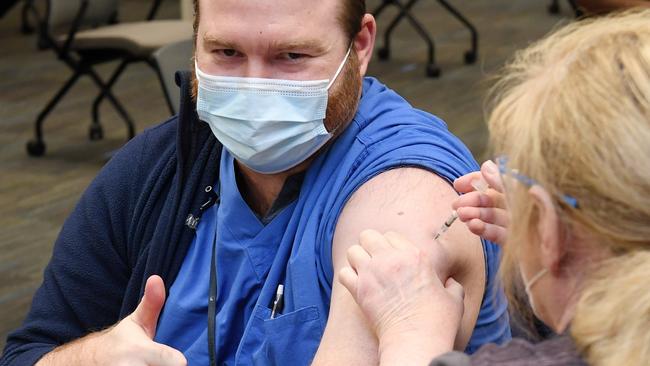Coronavirus: Europe vows to vaccinate as infections surge
European nations have vowed to get their coronavirus vaccination campaigns rolling within the next two weeks while a surge in infections prompts tighter restrictions.

European nations have vowed to get their coronavirus vaccination campaigns rolling within the next two weeks while a surge in infections prompts tighter restrictions across several countries.
Germany will begin vaccinations on December 27, its health minister said, detailing a timeline expected to be mirrored across the EU’s 27 member states.
France said it would receive about 1.16 million vaccine doses by year-end, with a further 2.3 million coming over the next two months.
The vaccination drive cannot come too soon to the embattled continent, which is fast approaching 500,000 deaths from the disease.
Germany saw a record 952 deaths in 24 hours, according to the Robert Koch Institute disease control centre on Wednesday, a figure that could rise as the hard-hit Saxony region was not included in Tuesday’s numbers.
“It feels like a Sunday,” said Ines Kumpl, 57, observing the deserted streets of Berlin on the first day of a new partial lockdown. “These measures are necessary but it’s stressful.”
Denmark, France, Turkey and The Netherlands have all tightened coronavirus restrictions and Spain’s Prime Minister expressed alarm at rising infection numbers there.
“To get to the end of the pandemic, we will need up to 70 per cent of the population vaccinated,” European Commission chief Ursula von der Leyen said.
Pressure has been mounting on the bloc since Britain and the US started their programs, using a vaccine developed in the EU by Pfizer and BioNTech.
The British government said more than 137,000 people had received a first dose in the week since inoculations began.
The World Health Organisation’s European wing warned of a resurgence of the virus on the continent early next year, urging special precautions over the holiday season. “It may feel awkward to wear masks and practise physical distancing when around friends and family, but doing so contributes significantly to ensuring that everyone remains safe,” the health agency said.
US Vice-President Mike Pence and his wife will get the vaccine on Saturday AEDT in a public display designed to boost fragile national confidence, the White House announced. The event comes in the first week of a mass US vaccination program aimed at stopping the surging pandemic, which has killed more than 300,000 Americans.
On Tuesday, White House press secretary Kayleigh McEnany said President Donald Trump was “absolutely open to taking the vaccine”.
Since he recently recovered from a bout of COVID-19, he is thought to be currently immune.
Meanwhile, Twitter on Wednesday said it would crack down on false posts and conspiracy theories about vaccines, following in the footsteps of Facebook and YouTube.
“We will prioritise the removal of the most harmful misleading information, and … label tweets that contain potentially misleading information about the vaccines,” Twitter said in a statement.
The policy will include action against claims that the vaccine is being used to intentionally cause harm or control people.
Brazil President Jair Bolsonaro performed an about-turn on Wednesday as he backed the national mass coronavirus immunisation campaign. His support came a day after he told the YouTube channel of a well-known television presenter that “I won’t get vaccinated. It’s my problem. Full stop.” Mr Bolsonaro contracted the coronavirus in July but recovered quickly.
Brazil on Wednesday set a record of infections — 70,574 cases in one day, although officials admit the true number is far higher.
In Canada, the pandemic is having a troubling knock-on effect on the opioid crisis, a government report said on Wednesday.
A total of 1628 people died of opioid overdoses from April to June, up 58 per cent from the previous quarter.
AFP



To join the conversation, please log in. Don't have an account? Register
Join the conversation, you are commenting as Logout